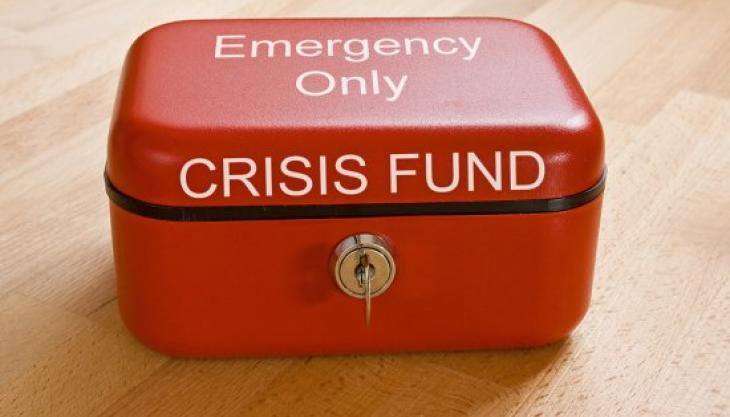5 Sure Fire Ways to Build Up an Emergency Fund to Protect Your Finances
Submitted by Rachel R on Fri, 12/12/2014 - 10:24am

Everyone needs an emergency fund
Many consumers live paycheck to paycheck. We hear this from our clients routinely no matter how much they're earning. We see people making six figures living on the brink of financial collapse the same as those earning very little. For those living that close to the edge, any little money crisis can break them – whether it's a higher than normal utility bill, a car breakdown, your refrigerator dying on you or any other unexpected expense.
Ideally, your emergency fund should cover three to six months of your expenses, but if this is a bit much to save up on your budget, try to build up to $500 then $1,000 then $2,000. Ideally, you should have enough money to get you through a few months of job loss to cover rent and expenses. If not, any amount you can save up to give yourself a buffer is ideal. Here are five ways to start saving up for a rainy day ASAP:
#1 Cut back on your household budget
This won't give you a lot of money fast but will get you started. Take your lunch to work instead of going out, carpool to save on gasoline, shop consignment stores instead of new for clothing, skip eating out, opt for Redbox or Netflix instead of the movie theaters, skip Starbucks and stop drinking and/or smoking (if you have either vice). These are just a few of the many suggestions that can trim $50-$200 off your monthly budget that can then go into your rainy day fund.
#2 Sell unneeded stuff
If you have a second car and you can get by with just one, sell your spare and put that money into your emergency fund. If you have sporting goods you don't use, spare furniture, your wedding or prom dresses, clothes your kids have outgrown, or other items - hold a garage sale, sell at a consignment store or put your stuff on Craigslist. You likely have a $1,000 or more of stuff lying around you can sell and put towards your emergency fund. If you haven't used it in a year and likely won't, consider selling it.
#3 Get another job (or gigs)
We wrote recently about some great reasons to consider a second job. This can be a way to create an emergency fund without dipping into your current budget. If you don't want a regular job, look for occasional gigs. Check out being a cater waiter, tutor or market any skills you have. If you can paint or hang wallpaper, put up some flyers and list yourself on Craiglist services - plus surf Craigslist for gigs you can do in spare time. Seasonal work at FedEx, USPS and Amazon is also something to consider.
#4 Cut your utilities and living expenses
Take steps to cut back on your utilities. In winter, put plastic over your windows to block drafts and seriously cut down on your heating bill. Keep the thermostat low and wear socks and cardigans to stay comfy. In summer, keep the ceiling fans on and the A/C up a little higher. Seal up drafts, turn off lights as you leave rooms, take shorter showers, wash laundry in cold water and don't run the heat cycle on your dishwasher. There are myriad ways to snip away at your expenses to be able to save more.
#5 Adjust your tax withholdings
If you get a fat tax refund each year, you may feel great about that. But, in fact, that's your money that you've loaned to the government interest-free over the year. Instead of giving Uncle Sam your money to hold, put it in your emergency fund. If you routinely get $3,000 back, that's the equivalent of $115 per paycheck. Increase your deductions to adjust your take home up and eliminate the refund. However, you don't want to underwithhold. Use this IRS withholding calculator to help you figure it out. It's too late this year to implement, but you can always take your tax refund from 2014 to seed your emergency fund then adjust your withholdings for 2015.
Final thoughts
And while it can be a hassle to make sacrifices like this, remember it's only a short term thing. Once you build up your emergency fund, you can ditch your second job, start eating out and going to movies again - but now you can do it with peace of mind knowing if you have an unexpected expense crop up, you can deal with it without borrowing it or going into crisis mode.
If you've suffered a financial setback, have bills piled up and are struggling to stay afloat, it may be time to consider a more serious solution. Contact the law offices of John T Orcutt to find out if bankruptcy can give you the fresh start you need. Come see us at one of our convenient North Carolina locations.
Debts Hurt! Got debt? Need help? Get started below!
Serving All of North Carolina
- Bankruptcy Attorneys Raleigh NC (North)
- Bankruptcy Attorney Fayetteville NC
- Bankruptcy Attorney Durham NC
- Bankruptcy Attorneys Wilson NC
- Bankruptcy Attorneys Greensboro NC
- Bankruptcy Attorneys Southport NC
- Bankruptcy Attorneys Wilmington NC
Bankruptcy Attorneys Raleigh NC (North)
6616 Six Forks Rd #203 Raleigh, NC 27615 North Carolina
Tel: (919) 847-9750

Bankruptcy Attorney Fayetteville NC
2711 Breezewood Ave Fayetteville, NC 28303 North Carolina
Tel: (910) 323-2972

Bankruptcy Attorney Durham NC
1738 Hillandale Rd Suite D Durham, NC 27705 North Carolina
Tel: (919) 286-1695


Bankruptcy Attorneys Greensboro NC
2100 W Cornwallis Dr. STE O Greensboro, NC 27408 North Carolina
Tel: (336) 542-5993

Bankruptcy Attorneys Southport NC
116 N Howe St. Suite A Southport, NC 28461 North Carolina
Tel: (910) 218-8682

Bankruptcy Attorneys Wilmington NC
116 N. Howe Street, Suite A Southport, NC 28461 North Carolina
Tel: (910) 447-2987
